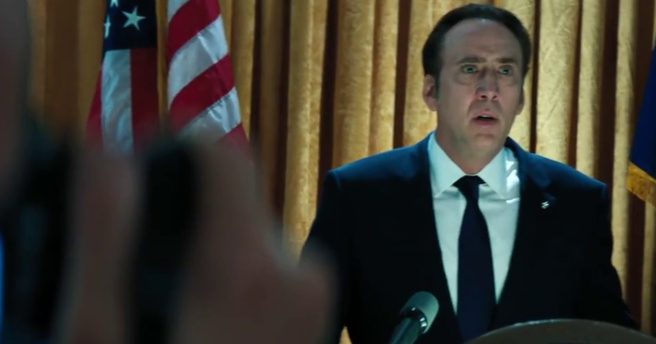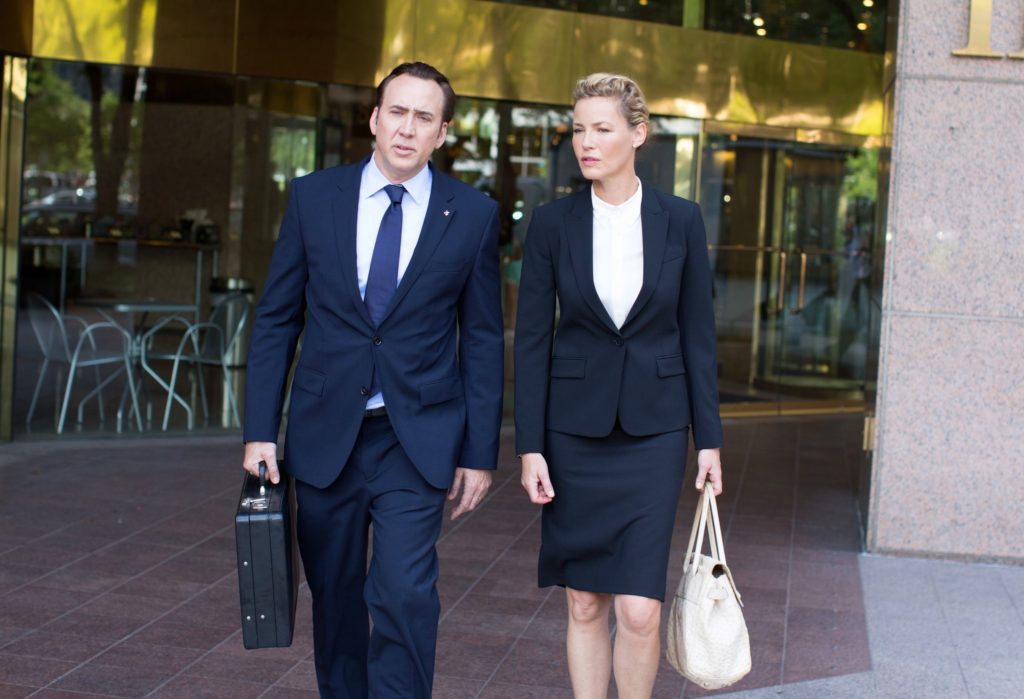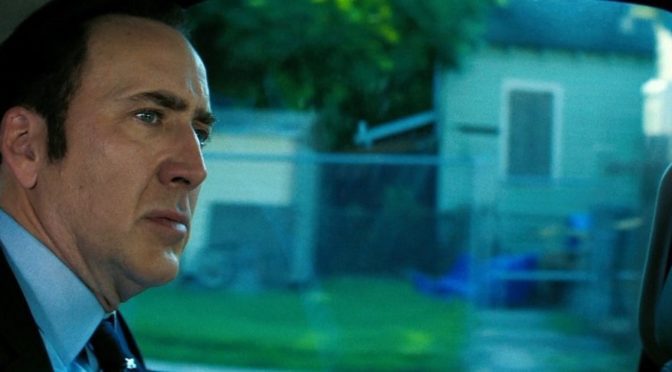Nicolas Cage is the world’s greatest gift to the Internet. This Oscar-winning madman careens heedlessly from arthouse indies to brainless, big-budget schlock, with stops everywhere in between. The fascination with Cage has inspired one of Community‘s finest bits, one of Saturday Night Live‘s funniest recurring installments, as well as terrific episodes of How Did This Get Made? and The Flop House.
For a special holiday edition of Bad Movie Review, Margaux suggested we focus only on Cage, in a feature we’re calling 12 Days of Cage-mas. We begin with The Runner.
Trevor: I don’t know about you, but I always feel reassured when a movie starts out with four or five production logos. How many studios did it take to get this made? And was it even in theaters? Two minutes into The Runner and I’m already baffled. Did they just see the name Nicolas Cage and cut a check? And if so, why?
Margaux: Before thecredits even started, I knew we were doomed; I kept forgetting what the movie was called, and searched for The Net on Netflix first. And then I remembered the word “Runner” and had to remind myself it wasn’t the one starring Justin Timberlake and Jean Ralphio. The name is so generic, this movie could have been about anything – and it was! BP oil, Louisiana, political scandal, divorce, family drama, and some of the most bananas camera work.
Trevor: Yeah, this movie had several problems (mostly in its crazy-ass act structure, which I’m sure we’ll get to). First of all, the framing device being the Deepwater Horizon explosion was an unfortunate choice, because it ultimately conflated a horrible ecological nightmare with one man’s personal turmoil. If that was the film’s intention, why do something as classless as using the BP oil spill? Why not just invent a natural disaster and use that? My guess it this was originally set somewhere else, then Louisiana offered a tax break, so the BP stuff was shoehorned in. And once people saw they got to try out Louisiana accents, they didn’t care about anything else. Although, the only actor who’s actually doing an accent is Cage, and most of the time he sounds like he’s doing an impression of Kevin Costner in JFK.
Margaux: Funny you say that because I made a note that Cage’s questionable accent (and how many times is he going to play someone from Louisiana?) had a touch of JFK and at times sounded flat just like Cage, calling it loosey goosey is somewhat generous. His passionate opening monologue was an unfortunate choice as well, but giving it this Congressional backdrop really limited their settings, it was a lot of half smiles and loud shouts in a dark room for 45% of the movie. Not only that, but this movie couldn’t decide what it was about exactly, the wild tonal shifts from thriller to romance to drama gave me whiplash. It was Louisiana: Second District County, it wasn’t sure from one scene to another what it was going to be about.

Trevor: You’re absolutely right, and what amazed me was that they were able to set a film in Louisiana and make it look so damn dry. Cage (whose name is Colin Pryce, apparently one of those lifelong Louisiana residents of Irish descent that the state is famous for) even sleeps in a long-sleeved shirt – how cold do you think the nights get? So the city really was window dressing, but that kind of brings me to my next point, which might make you scoff at me.
There was a lot of potential in The Runner. As a film, it’s flat, aimless, and pretty boring, but if you turned this into a miniseries, take the Show Me a Hero route, you could actually have time to explore the city, its residents, and even some of the side characters (like the Coast Guard Lieutenant Jenn Wyman, by far my favorite character, who got about two minutes of screentime). Make Colin Pryce an entryway instead of a focal point, and end on a morally ambiguous note, with him having compromised himself by getting into bed with the oil companies in an effort to help people affected by the spill. Like the Star Wars prequels, the best version of The Runner exists in my head.
Margaux: Haha. Well, this might shock you, but I totally agree. I felt bad for The Runner, especially Sarah Paulson, who probably thought she signed up for something closer to what you described. The Runner was an attempt at a political drama on a low budget action movie budget, and it really showed. It tried to blend elements of Taken to cover up holes and up the stakes (spoiler: it didn’t work), but if they followed the outline you proposed, the ending would’ve felt more like an actual ending instead of, “Oh, this seems as good a place as any to just…stop.”
Trevor: Haha, that’s a good way to put it. Most movies end; The Runner just stops.
But yeah, let’s talk about Sarah Paulson. First of all, she looks terrific here (even if she gets highlights out of nowhere), and she does an admirable job with her role. She has precious little chemistry with Cage, but honestly I blame that more on him. And the movie, for that matter; I didn’t know they had a preexisting relationship until their third or fourth scene together. I thought she was brought in as an Olivia Pope type. So another place The Runner falls short: establishing personal relationships. Like that of Pryce and his wife Deborah, played by Connie Nielsen in what looks to be a rejected House of Cards audition tape.
Margaux: Hahaha that’s one of those “it’s especially funny because it’s true” comments.
Cage and Paulson’s lack of chemistry showed through so painfully, it made their whole…affair feel like an awkward aside, am I really to believe that Sarah Paulson would allow Cage to consume half of her face in a kiss? His marriage made even less sense. I’m pretty sure he had a history of cheating before his “scandal” (which really didn’t feel like that big a deal, not resign big deal) because she did not seem surprised, but I was surprised by the force of her slap, she almost knocked Cage’s wig off. My problem with Deborah’s character is it wasn’t clear what she wanted – control? Power? She seemed to be doing fine without him. And this odd inclination to demonize her even though she was willing to put things behind them, it was all very professional, what’s wrong with that?
Trevor: The movie had no idea what to do with Deborah. I think that’s something that could have been addressed if the act structure weren’t so fucked up. Act one: BP oil spill. Reveal Pryce’s affair. Act two: scandal breaks, Pryce resigns, Deborah leaves him. Act three: he gets sober and starts his non-profit. Readers, most of what I just wrote happens in the first forty minutes, and if you’re wondering how The Runner fills the next fifty minutes, well, it doesn’t know either.

Margaux: Other than the welcome reappearance of Bunk from The Wire, and that I’m also pretty sure Cage drives a Ford Taurus for most of the movie, the last act of the movie was disjointed and sloppy, which really is the theme of the entire movie anyway so…
Trevor: Yeah, and speaking of disjointed, what was the film trying to say about alcoholism? Pryce’s dad, Rayne Price (lol), played by Peter Fonda in a strange Ghost Rider reunion, fucked up his career as mayor because he was a drunk. Cage fucked up his career while he was 16 years sober. So is the moral here some fathers-and-sons crap about life being predetermined? I hope not; if I wanted that, I’d go watch the far superior Place Beyond the Pines. To be fair, I’m extrapolating, because the father-son relationship is another one that The Runner wasn’t too interested in. Which is too bad, because Fonda gave one of the movie’s best performances.
Margaux: Umm, well Fonda does exclaim over a heated family lunch, “I WAS THE BEST MAYOR THEY EVER HAD!” so “best performance of the movie” does come with some asterisks.
Trevor: Okay, instead of “best” I’ll say “most watchable.” Plus he looked like Esteban in Kill Bill Vol. 2.
Margaux: My God, even his death was a giant, WHOMP WHOMP. Not like they weren’t heavy with the clues that he wouldn’t survive the surgery, but still, it’s Peter Fonda, he deserves better than what he got. When Cage receives the news, we don’t even hear it, it’s signified by an empathic lean back in his chair and then hard cut to black. So many off-putting choices.
Trevor: Yeah, Cage was way too subdued here, and The Runner really could have used a shot of life. He had the opportunity to go full Cage, first when his dad dies, then again when Kate (Paulson) tells him she’s getting back with her husband. I guess this is what happens when he “acts”? But that’s something he’s genuinely good at, so…I don’t know, this man is so baffling. One thing I hope we figure out over the course of this feature is, has there ever been a movie star anything like Nicolas Cage? How does one man give a career-best performance in Adaptation and then do The Runner, or any number of pointless films he’s done in between?
Margaux: Well, I hope we find some answers over the course of 12 Cage movies. He really is an enigma, his IMDB filmography is almost a 50/50 blend of highbrow and lowbrow movies. The only other person I feel you can compare his career to is Werner Herzog.
Trevor: Right, which is why Bad Lieutenant: Port of Call New Orleans is such a classic. That’s why I’m excited for our next film: Snake Eyes, wherein Cage is paired with Brian de Palma, an idiosyncratic weirdo who might know how to match Cage’s crazy intensity and intense craziness.
Margaux: He’s wearing a fucking bowling shirt on the poster, what could possibly go wrong over the course of 90+ minutes.
Trevor: Is there anything else you want to add about The Runner?
Margaux: It’s probably the least fun Cage movie I’ve watched, which is a bummer. There was a glimmer of Vampire’s Kiss Cage when he rattles off a list of hurricanes he’d worked through (“Katrina, Gustav, Ike!”). But other than that, this movie was as dry as the landscape, and its confused plot made it hard to follow at times. Its worst offense was Cage’s accent.
Next up: Snake Eyes





